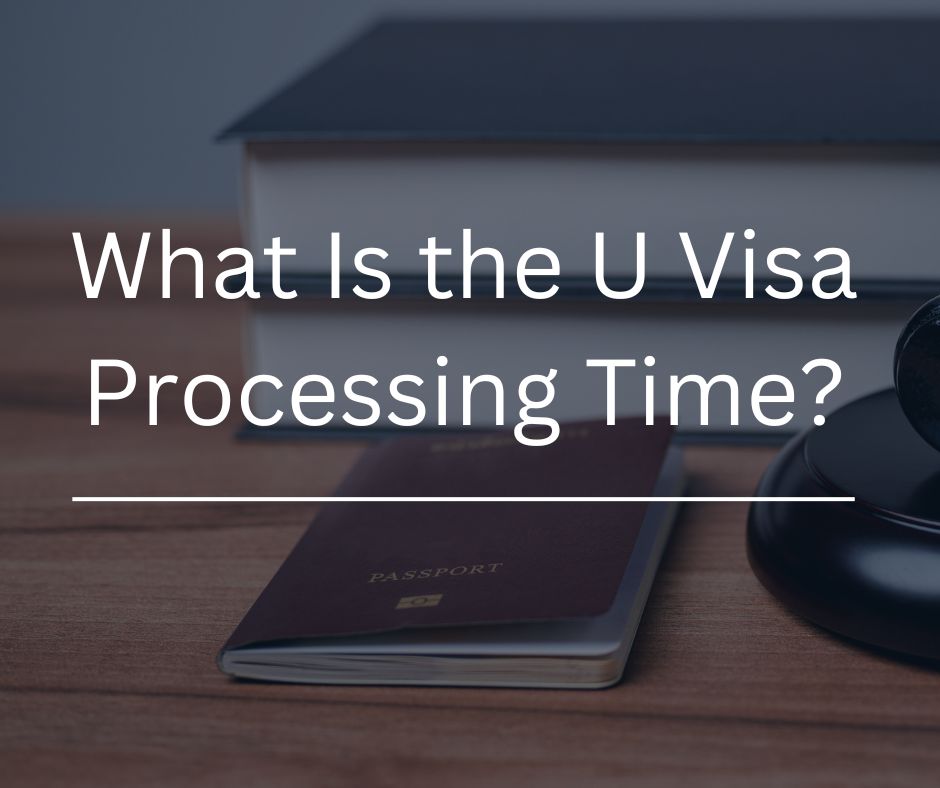
The U Visa is unique among U.S. visas. It allows crime victims to receive a visa and eventually a green card so long as they cooperate with the criminal investigation.
As of 2025, U Visa processing through USCIS takes approximately 32.7 months for Form I-918. This timeframe includes review, background checks, and waiting for visa availability. Processing times vary based on application volume, background check issues, and annual visa caps.
While your U Visa is pending, you may live in an uncertain status or have many documents to maintain.
If you need help applying for a U Visa, ensuring you maintain the status granted by the visa, or transitioning from a U Visa to a green card—EMP Law’s skilled immigration lawyers can help. Our experience with immigration law places us in a strong position to help those seeking U Visas.
Contact us online or call (336) 724-2828 today for assistance.
What Is a U Visa?
If you are a noncitizen who is victimized by a crime in the U.S. or a U.S. territory or military base, you may qualify for a U Visa. The U Visa was created alongside the T Visa (for victims of human trafficking) to encourage noncitizens to report crimes and cooperate with criminal investigations regardless of their immigration status.
The Purpose of the U Visa
The government is aware that noncitizens with uncertain or no legal immigration status may hesitate to report crimes due to a fear that reporting will jeopardize their ability to stay in the U.S. Because the government prefers that even those without status report when they have been the victim of a crime, it offers the U Visa as a sort of safe haven and, potentially, reward for helping the government to solve the crime.
Qualifying Crimes
Unfortunately, qualifying for a U Visa first requires you to be the victim of a qualifying crime.
Many crimes qualify, such as:
- Abduction and kidnapping,
- Sexual abuse and exploitation, and
- Extortion and blackmail.
For the crime to potentially entitle you to a visa, it generally must have occurred on U.S. soil, including U.S. states, territories, military installations, and Native American land.
Other Qualifications
If you were the victim of a qualifying crime in the U.S., you may be eligible for a U Visa if you:
- Have useful information about the crime, like who committed it or what they specifically did;
- Have already helped law enforcement attempt to solve the crime or are willing and able to help;
- Suffered physical or mental abuse as a result of the crime; and
- Have a good immigration status, or you merit a waiver of your lack of good status.
Many noncitizens in the U.S. lack good status because they are “inadmissible,” which means they have done something or have some characteristic that violates U.S. immigration law.
These issues that prevent you from getting a good status are inadmissibility grounds. Common inadmissibility grounds include:
- Entering the country without passing through a U.S. border control point, like customs;
- Being physically present in the U.S. without good status; and
- Committing certain crimes.
To merit a waiver of your lack of good status, you must convince the officer reviewing your U Visa application that the reasons that make you inadmissible and ineligible for a U Visa without a waiver are in the past or otherwise do not reflect on your character.
Waivers of Inadmissibility
When USCIS officers evaluate whether someone qualifies for a U Visa, they may waive any inadmissibility issues you have. To facilitate this goal, United States Citizenship and Immigration Services (USCIS) provides a special form, I-192, Application for Advance Permission to Enter as a Nonimmigrant. You can use this form to request that the USCIS waive any issues that could prevent you from receiving a visa, like time spent in the U.S. without legal status.
Coming to the U.S. Based on a U Visa
U Visa processing times are not quick. As a result, you may report a crime, cooperate with law enforcement in the U.S., and apply for a U Visa with their support before something occurs that means you need to depart the U.S. Because your application is still pending, you do not have good status that would authorize you to reenter the U.S.
This situation means that the government may lose potential witnesses, who may be unable to return to the U.S. when, for example, a criminal trial occurs. If the government wants to call a noncitizen as a witness in court and can no longer do so, it may struggle to prove that the crime occurred.
It is in the government’s interest to offer a way for the noncitizen to return. You can use Form I-192 to ask for permission to return in advance.You can also use Form I-192 to help bring certain family members to the U.S. based on your U Visa. You can use the form to request a waiver of any inadmissibility issues those family members have or to get permission for the family member to travel to the U.S. if they are abroad.
Qualifying family members are generally those with whom you can share your good status in the U.S. as “derivatives” on a primary U Visa application, which is an application for a U-1 Visa. Typically, possible derivatives include spouses (U-2 Visas), unmarried children under age 21 (U-3 Visas), parents (U-4 Visas), and siblings under age 18 (U-5 Visas).
How Do You Apply for a U Visa?
To apply for a U Visa, you submit Form I-918, Petition for U Nonimmigrant Status, along with Form I-918, Supplement B, and U Nonimmigrant Status Certification. Supplement B must be completed by a law enforcement officer. These documents should include a description of the crime and how you are assisting in its investigation.
U Visas generally last four years. After living three years in the U.S. with a U Visa, you can apply for a green card using Form I-485, Application to Register Permanent Residence or Adjust Status.
How Do U Visas Get Processed?
Each year, the government issues up to 10,000 U Visas. However, more than 10,000 people have applied for U Visas over the last several years, resulting in a growing backlog of U Visa cases that USCIS has yet to decide. Because of the yearly visa limit and the backlog it creates, U Visa processing times have ballooned over the years.
To minimize the effects of processing delays, USCIS created a deferred action system, first through a waiting list, then a bona fide determination. Yet, numerical limitations mean the expected U Visa approval time just keeps growing.
The U Visa Backlog
Every year, USCIS processes outstanding U Visa applications chronologically from the date they were submitted. Once it issues 10,000 U Visas, it stops for the year.
Visa backlogs typically begin to build up in two circumstances: USCIS does not actually issue 10,000 U Visas before the year ends, or more than 10,000 people who meet the requirements apply for U Visas. USCIS considers the applications in the order received.
Yet, USCIS must review each application to determine whether the applicant meets every requirement, including the often fact-intensive decision of whether someone’s case indicates the officer should waive past immigration violations. That means USCIS must have enough staff to process each application promptly enough to get through 10,000 approvals in a year. Unfortunately, as the annual limit and USCIS staffing limitations have interacted over time, backlogs have grown.
The U Visa Waiting List
To respond to the growing U Visa backlog, USCIS created a waiting list as a deferred action program. Like the Deferred Action for Childhood Arrivals (DACA) program, the U Visa waiting list’s deferred action status promises beneficiaries that it will not generally target them for deportation for a specific period.
Ultimately, there are many noncitizens in the U.S. who have committed violations that the government prioritizes for deportation over those with deferred action.
Up until 2021, U Visa applications were placed on the waiting list after a USCIS officer confirmed the application was legitimate. Once placed on the waiting list, the U Visa applicant qualified for deferred action and employment authorization. However, in 2021, USCIS replaced the waiting list process with a bona fide determination process.
The U Visa Bona Fide Determination Process
Like the waiting list process, USCIS’s bona fide determination process grants U Visa applicants deferred action status while their applications are pending.
USCIS created the bona fide determination process to address the problem created by its inability to promptly and accurately determine whether an applicant qualifies.
The bona fide determination process filters out unsupported or unsupportable applications. A USCIS officer concludes an application is not bona fide if they decide the applicant does not qualify for a U Visa without completing a highly detailed analysis. A determination that an application is not bona fide means USCIS will not complete an in-depth analysis because it does not need to. The officer has concluded that the application is not legitimate or indicates that the applicant does not qualify for a U Visa.
Applications placed on the waiting list on or before June 14, 2021, generally do not go through the bona fide determination process. From June 14, 2021, and on, applications go through the bona fide process, which involves a USCIS officer determining that the U Visa application is genuine.
U Visa applicants submitted after June 14, 2021, first go through the bona fide determination process. Once USCIS confirms that the applicant may qualify, the applicant can get work authorization and an official U.S. government ID, simplifying many aspects of day-to-day life.
After concluding the application is legitimate, USCIS determines whether the applicant truly qualifies by carefully evaluating all evidence provided. After that, USCIS issues U Visas to qualified applicants.
In 2023, the USCIS had a lengthy 64.5-month U Visa processing time. That number applied to bona fide determinations, not actual visa issuance. As of June 2025, USCIS is making bona fide determinations in approximately 80% of cases within 35 months, a reduction by almost half since 2023.
How Do You Get Work Authorization Based on a U Visa?
To obtain an employment authorization document (EAD), you submit Form I-765, Application for Employment Authorization. You can submit your I-765 with your I-918 or at a later date, but you will not receive an EAD until after USCIS determines you have a bona fide application. At present, the U Visa work permit processing time is tied directly to the bona fide determination process.
Once USCIS issues a bona fide determination, you qualify for an EAD. Since the typical time to reach a bona fide determination is currently just under three years, the U Visa work permit waiting time is also just under three years
Contact Us for Help With the U Visa Process
U Visas encourage noncitizens, including those without legal status, to report crimes and cooperate in the prosecution. However, lengthy U Visa processing times can complicate things.
If you are considering applying, have already applied but need assistance with your case, or need to discuss your U Visa options, reach out to our firm online or call (336) 724-2828 today.


